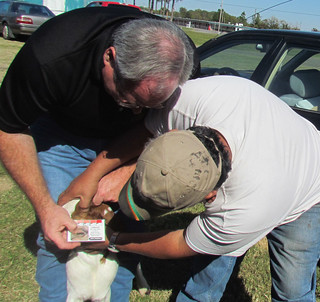Control barber pole worms in sheep, goats
FAMACHA scoring your sheep or goats can help you identify which ones require deworming and which ones do not. (Image courtesy UAPB)
PINE BLUFF, Ark. – Warm, humid conditions favor the survival of many parasites including barber pole worms. Sheep and goat produces need to be aware of them and their control, says Dr. David Fernandez, Cooperative Extension Program livestock specialist at the University of Arkansas at Pine Bluff.
Barber pole worms are blood-sucking parasites that live in the true stomach of sheep, goats, llamas and alpacas. They can cause diarrhea, poor appetite, lethargy, anemia, bottle jaw, and if left untreated long enough, death. If untreated, a sheep or goat carrying as few as 5,000 barber pole worms can die in little over a month, says Dr. Fernandez.
Barber pole worm eggs are shed in feces. The eggs hatch, and the larvae live in the manure. In their third stage of development, they migrate away from the manure and climb up the grass. They usually do not travel more than 12 inches from the manure and then only climb about 2 to 3 inches up the grass blade. There they wait to be eaten. Once inside the host, they complete their development, mate, begin sucking blood and laying the next generation of eggs.
Chemical dewormers can be used to control barber pole worms, but overuse has reduced the efficacy of most of them, says Dr. Fernandez. A few natural products can be used, too.
“Good management techniques can help prevent infection in the first place,” says Dr. Fernandez. Rotational grazing can reduce the number of parasites livestock consume. By moving animals from one pasture to another, the larvae don’t get eaten and die.
Avoid overgrazing, he advises. Leave at least 3 and preferable 4 inches of grass when rotating. Don’t put hay on the ground. Instead, use a feeder that makes animals eat with their heads up.
“If you can keep them from grazing or eating close to the ground, they will eat fewer parasites,” he says.
Getting rid of all the worms in a herd or flock is impossible. Resistance to dewormers is a natural occurrence so even with deworming, some parasites will be alive and well. This is why only animals in need of deworming should be treated.
“It may not sound like common sense, but you actually want to leave some parasites untreated,” says Dr. Fernandez. Untreated worms are not resistant to the dewormer. When resistant worm eggs hatch, they are surrounded by worms still susceptible to the dewormer. When the worms mate, the resistant ones are more likely to encounter and mate with susceptible worms so their offspring are less likely be resistant to your dewormer.
FAMACHA scoring helps ranchers determine which animals need deworming. Keep track of the ones that do repeatedly and cull them from the herd, advises Dr. Fernandez.
Plants high in condensed tannins, such as sericea lespedeza, chicory, sainfoin and birdfoot trefoil can help control barber pole worms. Copper oxide wire boluses have also proven effective in reducing barber pole infestations. Chemical dewormers still work, but check to see which ones work on your farm. Resistance to dewormers must be determined on a farm by farm basis.
For more information about barber pole worms, FAMACHA scoring or other livestock-related problems, contact Dr. Fernandez at (870) 575-7214 or fernandezd@uapb.edu.
By Carol Sanders, writer/editor
UAPB School of Agriculture, Fisheries and Human Sciences
(870) 575-7238
sandersc@uapb.edu
